Trump on Earth
Air Date: Week of July 26, 2024
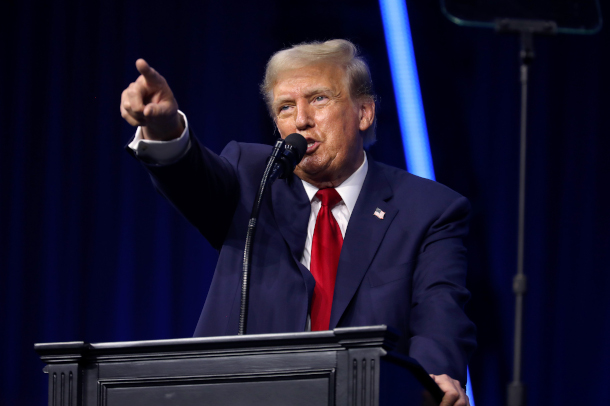
Former President Donald Trump speaking at The People's Convention on June 15 in Detroit. (Photo: Gage Skidmore, Flickr, CC BY-SA 2.0)
The four years of the Trump Administration brought over a hundred regulatory rollbacks, the exit of the US from the Paris Climate Agreement, and a conservative dominated Supreme Court that is skeptical of environmental regulation. Inside Climate News Reporter Marianne Lavelle joins Hosts Steve Curwood and Jenni Doering to share insights from a former Trump EPA official, environmental policy experts and advocates about the environmental impacts of the Trump presidency and what a second one could bring.
Transcript
CURWOOD: Let’s take a look now at the environmental record and plans of the Republican nominee for President, Donald Trump. Marianne Lavelle of our media partner Inside Climate News reported on climate and environmental policy throughout the Trump presidency and she joins us now from Washington, D.C.
DOERING: Hi Marianne, welcome back to Living on Earth!
LAVELLE: Thank you, great to be here!
DOERING: So sou know, Donald Trump came into office in 2017 vowing to roll back various climate and environment regulations. So where should we begin?
LAVELLE: Well, let’s start with an especially memorable move, when he pulled the US out of the Paris Climate Agreement. I talked to Trump’s former chief of staff at EPA, Mandy Gunasekara, who described what it was like to be in “the room where it happened.”
GUNASEKARA: Early on, one of my first briefings with the President, I was with administrator Scott Pruitt, and the Chief of Staff at that time, and we went in, and we were sufficiently outnumbered in terms of, there were three of us representing, we were advocating getting out. And I would say the rest of the room with about 20 plus people had a lot of people that were in the camp of “we should stay in.” And then a strongly worded and heated debate ensued. But what the President would do in these situations is sit back and listen and ask probing questions that I believe resulted in him making really good consistent policy choices all throughout his administration, because he really did like to hear both sides of the argument.
CURWOOD: Sounds like the ‘pull out of Paris’ camp was way, way outnumbered, so Marianne, what swayed Trump to pull out?
LAVELLE: Ms. Gunasekara said it came down to concerns about how the Paris Agreement could affect the economy. There was a study by an oil and gas consulting firm sponsored by the US Chamber of Commerce that estimated the agreement would cost the US 2.7 million jobs by 2025.
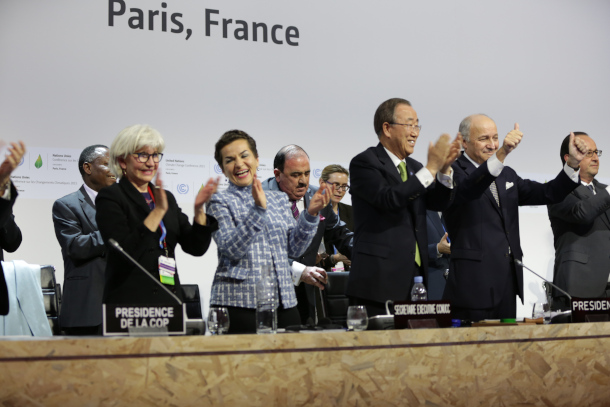
Adoption of the Paris Climate Agreement on 12 December, 2015. (Photo: UNclimatechange, Wikimedia Commons, CC BY 2.0)
GUNASEKARA: It broke down the impact that the Paris Climate Accord would ultimately have on some key industries and industries that the President cared a lot about. He really focused on bringing, and reinvigorating the life of the American worker, first with ensuring or growing the opportunity for a job, and then the affiliated community investments and growth alongside it. So, it really it came back to what is this going to do to American jobs?
CURWOOD: Well, Marianne, that certainly plays right into the concerns of conservative voters, huh?
LAVELLE: It does, but those job loss claims were unfounded. Since President Biden re-entered the Paris Agreement, the US has added 7.5 million jobs compared to the pre-Covid pandemic high during the Trump administration. Turning away from the Paris Accord was just one part of Donald Trump’s “America First” emphasis on pulling back from the rest of the world. But Samantha Gross, who directs the Energy Security and Climate Initiative at the Brookings Institution says this approach came at a cost.
GROSS: The real fallout from former President Trump removing us from the Paris Accord is that we really just lost our credibility internationally on climate issues. The US was no longer a respected party in international efforts to combat climate change. I mean, we really sort of, we didn't entirely fall off the face of the earth. We still sent delegations, but we weren't considered in any way seriously during that time.
LAVELLE: Meanwhile the administration was shifting to domestic concerns. Again, Mandy Gunasekara.
GUNASEKARA: At EPA, we had an affiliated agenda, what we called “back to basics,” which really was getting EPA back to focusing on cleaning up the air, cleaning up the water, addressing legacy pollution, and continuing to improve industrial efficiencies that lent itself to reduced greenhouse gases.
LAVELLE: And a couple of examples she mentioned were the updating of the Lead and Copper Rule and an action plan for PFAS or “forever chemicals”. But Tiernan Sittenfeld of the League of Conservation Voters rejected this claim that EPA got “back to basics” under Trump.
SITTENFELD: That's, it's nonsense. The Trump administration was the most anti-environmental, anti-climate, anti-public health administration we've ever had, by far. It was just breathtaking, the extent to which they rolled back protections for clean air, for clean water, for public lands, that led to more toxic pollution into communities all across this country, especially the frontline and the fence line and the communities of color that have been hit first and worst by toxic pollution by decades.
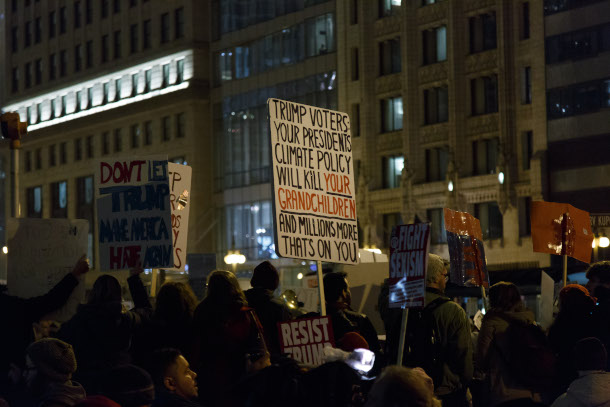
Protesters gathered in Chicago following the inauguration of Donald Trump in 2017. (Photo: Rob Walsh, Wikimedia Commons, CC0 1.0 UNIVERSAL)
[MUSIC: Joe Pass, “Chloe” on Intercontinental, Edel Germany GmbH]
DOERING: We’re talking with Marianne Lavelle of Inside Climate News and we’ll be back in a moment to talk about those regulatory rollbacks. Stay tuned to Living on Earth!
[MUSIC: Joe Pass, “Chloe” on Intercontinental, Edel Germany GmbH]
ANNOUNCER: Support for Living on Earth comes from Sailors for the Sea and Oceana. Helping boaters race clean, sail green and protect the seas they love. More information @sailorsforthesea.org.
[CUTAWAY MUSIC: Joe Pass, “Chloe” on Intercontinental, Edel Germany GmbH]
CURWOOD: It’s Living on Earth, I’m Steve Curwood.
DOERING: And I’m Jenni Doering.
We’re continuing our conversation with Marianne Lavelle of Inside Climate News about the environmental record of the Trump administration. So, Marianne, as I recall, regulatory rollbacks were a big focus of Donald Trump’s 2016 campaign.
LAVELLE: That’s right, Jenni. So Michael Gerrard, founder and director of the Sabin Center for Climate Change Law at Columbia, was ready.
GERRARD: On the day that Trump was inaugurated, we launched a website called the climate deregulation tracker to keep track of what he was doing. By the end of the administration, there were 176 entries on that tracker.
LAVELLE: There was everything from weakening methane emission rules for oil and gas, to amending coal ash regulations, to approving the Keystone XL and Dakota Access Pipelines. And a lot more. But Michael Gerrard says one rollback trumps them all.
GERRARD: The regulatory rollback under Trump that had the greatest impact on climate change was weakening the fuel economy standards. Motor vehicles are the largest source of greenhouse gas emissions in the United States. Under President Obama, the emissions standards and the fuel economy standards were going to be much tighter. Trump basically froze those. And that led to, one calculation is 1 billion metric tons of carbon dioxide equivalent, more than would have been emitted otherwise.
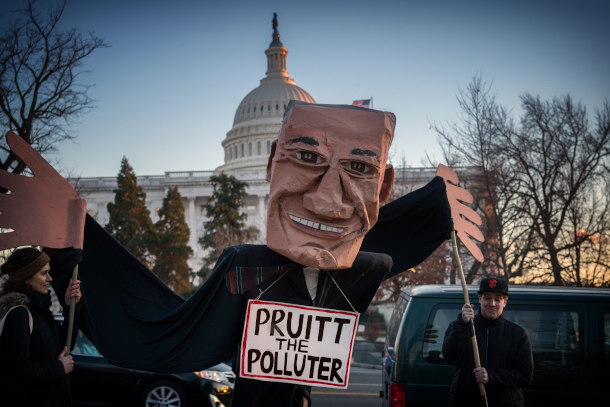
Former EPA Administrator Scott Pruitt was widely unpopular during his tenure, leading to protests in Washington, D.C. (Photo: Lorie Shaull, Wikimedia Commons, CC BY-SA 2.0)
CURWOOD: Yeah – a huge impact on climate change and those emissions have a big health toll, too.
LAVELLE: Right Steve. Now sometimes the rollbacks came back to bite Trump, such as when he dramatically shrank two national monuments in Utah, says Kristen Brengel of the National Parks Conservation Association.
BRENGEL: But notice what happened here is that they did Bears Ears and Grand Staircase and then stopped. They had about another dozen monuments on the list and they stopped the whole process because it was so wildly unpopular with the public. And so -- listen, people make mistakes, administrations certainly make mistakes. But that was a massive mistake.
DOERING: So how effective were Trump’s environment and climate moves?
LAVELLE: Well, they haven’t stuck. In 2021 the Biden administration immediately came in and got to work restoring those monuments, reinstating the rules Trump had rolled back, and re-entering the Paris Agreement.
DOERING: Well, so Marianne, what’s the lasting impact, here?
LAVELLE: For that you can look not to the executive branch but to the judiciary, according to Michael Gerrard of Columbia. The courts have become more and more friendly to these environmental rollbacks, thanks to the couple hundred federal judges Trump appointed to lifetime terms. And as you’ve probably heard, a few of those appointments are extremely important.
GERRARD: Well, Trump, of course, appointed three justices to the Supreme Court who are consistently voting against environmental regulation, we now have a six to three majority. And it has been systematically cutting back on environmental regulations.
LAVELLE: So, for example the court has shrunk wetlands protections and limited agency authority.
CURWOOD: Well, what can we look back on from the Trump administration that brought benefits for the environment or climate?
LAVELLE: Well, Kristen Brengel of the National Parks Conservation Association celebrated the bipartisan accomplishment of the Great American Outdoors Act, which President Trump signed.
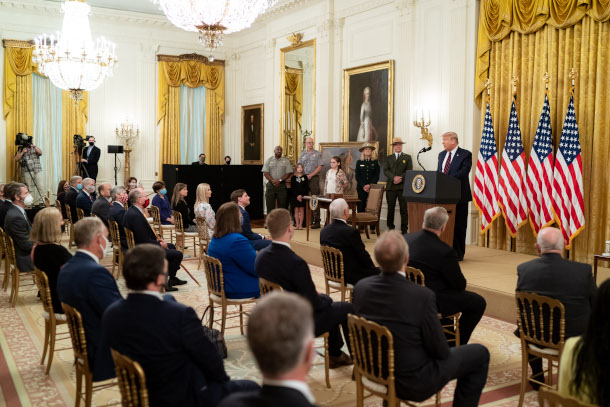
An important executive action related to conservation and public lands policy by President Trump was the signing of H.R. 1957, also known as The Great American Outdoors Act. He is shown here speaking before the formal signing. (Photo: The White House from Washington, DC, Wikimedia Commons, Public Domain)
BRENGEL: Hundreds of national parks, national forests are getting repaired even this summer thanks to this law. And so, on one hand, absolutely the Trump administration deserves credit for making sure that bill was as robust as it possibly could have been and signed into law. And the Biden folks deserve the credit for implementing it really well, and making sure our parks are going to be fit for the next couple of generations.
DOERING: So, let’s look ahead to the near future. I understand you got some perspective from these folks on what a second Trump presidency might look like vis-à-vis climate and environment.
LAVELLE: Yes, Jenni, here’s Michael Gerrard of the Sabin Center again.
GERRARD: We know that the Inflation Reduction Act, that money, has only marginal vulnerability to a new administration. And we know that the market forces are moving renewables forward at a fast pace. But we need regulations to shut down the coal fired power plants, and the other major fossil fuel uses. That depends in significant part on regulations. And these regulations are really in peril, thanks to the Supreme Court and the lower court judges appointed by Trump.
LAVELLE: So, Michael says it’s hard to overstate the impact on climate and environmental policy that this conservative shift has had. And what that could mean for a second Trump term.
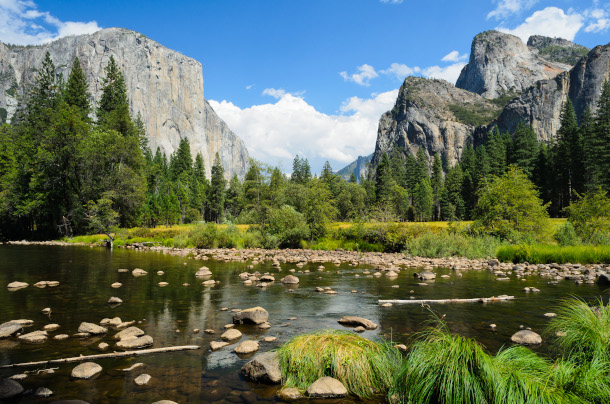
Valley View in Yosemite National Park. Yosemite, among many other national parks like Bryce Canyon, Death Valley, and Rocky Mountain, benefited from the Great American Outdoors Act with improvements to visitor facilities and infrastructure systems. (Photo: King of Hearts, Wikimedia Commons, CC BY-SA 3.0)
GERRARD: Well, if Trump comes back, it's gonna get a whole lot worse. If we look at the project 2025 report from the Heritage Foundation, which many people are looking at as a blueprint for what a second Trump administration would be, it would be the first Trump administration on steroids. They would continue the process of trying to revoke all those regulations. They would fight new renewables. And it would be “drill, baby, drill.”
CURWOOD: So, Donald Trump says he’s not tied to Project 2025, but in any event how does Mr. Trump plan to address the climate crisis?
LAVELLE: Well Steve, although we haven’t heard him call it an outright hoax in recent years, he has expressed no concern about what scientists are calling an existential crisis for humanity. And the 2024 Republican Party Platform which was directly shaped by Trump and his staff doesn’t even include the word “climate.” Tackling the climate crisis would certainly be at odds with the big plans the GOP and Trump have for fossil fuels.
DOERING: Yeah, you know, he had some glowing words for them on the final night of the Republican National Convention in Milwaukee, Wisconsin.
TRUMP: Remember we have more liquid gold under our feet than any other country by far. We are a nation that has the opportunity to make an absolute fortune with its energy. We have it and China doesn’t. Under the Trump administration just 3.5 years ago, we were energy independent. But soon, we will actually be better than that. We will be energy dominant and supply not only ourselves, but we will supply the rest of the world. [cheers]
Project 2025: "[NOAA] has become one of the main drivers of the climate change alarm industry and, as such, is harmful to future U.S. prosperity. ... [NOAA] should be broken up and downsized."
— Dr. Robert Rohde (@RARohde) July 17, 2024
Basically, they want to shoot the messenger https://t.co/x76zK4IeII
LAVELLE: And we noticed that Mr. Trump went off script during much of his speech, and he couldn’t resist taking a jab at the Inflation Reduction Act, the Democrats’ climate legislation.
TRUMP: And next we will end the ridiculous and actually incredible waste of taxpayer dollars that is fueling the inflation crisis. They spent trillions of dollars on things having to do with the green new scam, it’s a scam, and that’s caused tremendous inflationary pressures in addition to the cost of energy. And all of the trillions of dollars that are sitting there not yet spent, we will redirect that money for important projects like roads, bridges, dams, and we will not allow it to be spent on meaningless green new scam ideas. And I will end the electric vehicle mandate on day 1 [cheers] thereby saving the US auto industry from complete obliteration which is happening right now and saving US customers thousands and thousands of dollars per car.
LAVELLE: To be clear, there is no electric vehicle mandate. And it’s unclear how a Trump administration would repeal the grants, loans, and tax credits of the Inflation Reduction Act without new legislation in Congress. He’d need Republican control of the House and Senate, so even though this presidential election is getting most of the attention now, Steve, we can’t forget about those down ballot races, too.
CURWOOD: That’s right, Marianne. Marianne Lavelle reports for Inside Climate News from the nation’s capitol. Thanks so much!
DOERING: Thanks, Marianne!
LAVELLE: Thanks, Steve, thanks, Jenni!
Links
Read more from Marianne Lavelle on Donald Trump’s Eco Record
Watch Donald Trump’s Speech at the Republican National Convention
Listen to our analysis of J. D. Vance, Donald Trump’s running mate
Living on Earth wants to hear from you!
Living on Earth
62 Calef Highway, Suite 212
Lee, NH 03861
Telephone: 617-287-4121
E-mail: comments@loe.org
Newsletter [Click here]
Donate to Living on Earth!
Living on Earth is an independent media program and relies entirely on contributions from listeners and institutions supporting public service. Please donate now to preserve an independent environmental voice.
NewsletterLiving on Earth offers a weekly delivery of the show's rundown to your mailbox. Sign up for our newsletter today!
 Sailors For The Sea: Be the change you want to sea.
Sailors For The Sea: Be the change you want to sea.
 The Grantham Foundation for the Protection of the Environment: Committed to protecting and improving the health of the global environment.
The Grantham Foundation for the Protection of the Environment: Committed to protecting and improving the health of the global environment.
 Contribute to Living on Earth and receive, as our gift to you, an archival print of one of Mark Seth Lender's extraordinary wildlife photographs. Follow the link to see Mark's current collection of photographs.
Contribute to Living on Earth and receive, as our gift to you, an archival print of one of Mark Seth Lender's extraordinary wildlife photographs. Follow the link to see Mark's current collection of photographs.
 Buy a signed copy of Mark Seth Lender's book Smeagull the Seagull & support Living on Earth
Buy a signed copy of Mark Seth Lender's book Smeagull the Seagull & support Living on Earth

